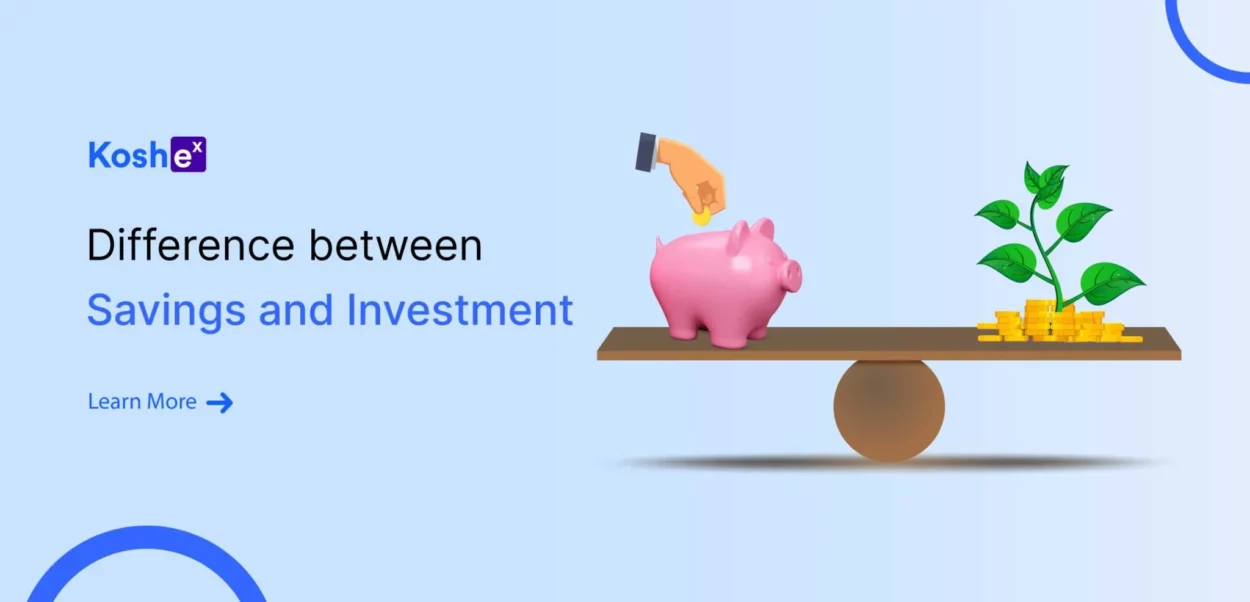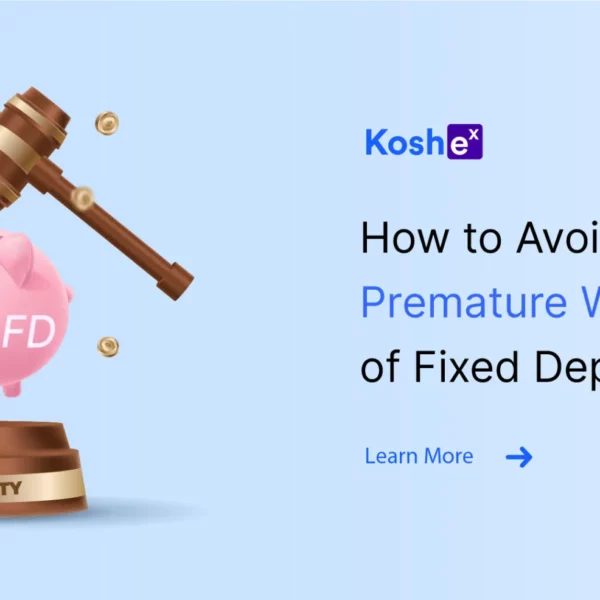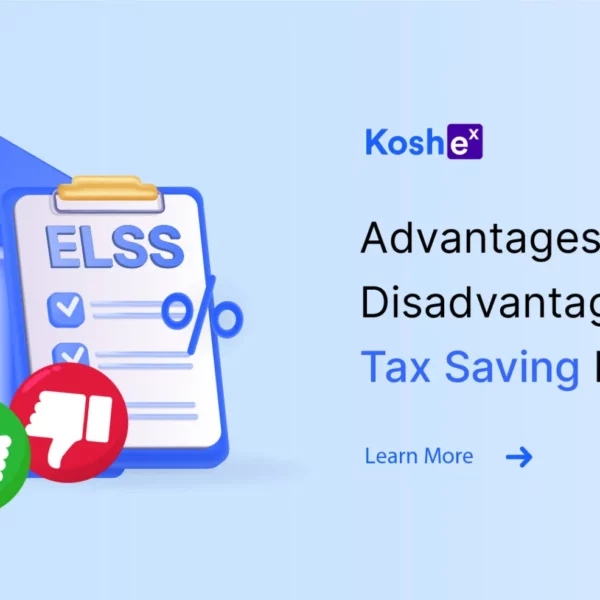Savings And Investments
Saving and investing money is highly important if you wish to achieve your goals and secure your future. The terms, however, have always been used interchangeably.
Many people think that saving money and investing money are the same thing. The truth couldn’t be more different. In this article, we will be talking about saving and investing, their differences, and how they can benefit your financial journey.
Even from childhood, the idea of saving money is cultivated deeply in our minds. We are encouraged to save the cash gifts our relatives give us in our tiny piggy banks.
Though the topics of money management might not be openly discussed in many families, we are still taught to save and invest money from our first salary.
The recent generation of Indian investors, including millennials and Gen Z, are actively investing in multiple investment instruments.
A study by Zinnov, a management consulting & strategic advisory company, titled, “Rise of the Indian Retail Investor,” said that retail investors these days are quickly transitioning from savings instruments like Fixed Deposits to new-age financial products like REIT (Real Estate Investment Trusts), small cases, NFTs (Non-Fungible Tokens), and digital gold.
More than 70% of retail investors save up to 30% of their monthly income for investments, found the study.
More and more Indians are investing a portion of their income every month. However, saving and investing are two different things. Here’s how they differ.
What Is Saving?
Saving is the process of putting money aside for a future expense by parking it in your bank account. Ideally, you don’t use the money that is in that account until you have reached the amount you need. The saved money is available relatively immediately when you need it, for purchases and emergencies, and it carries extremely low risk and is highly liquid.
Why do people save money? There are a couple of reasons why people save and they are as follows:
- A rainy day fund for emergencies
- A down payment for a car or a home
- Putting money aside for a trip, new appliances, or a car
- Short-term educational expenses
- Using alternatives for tax-free savings accounts
When you hear the term, ‘saving money,’ you can think of bank products like savings accounts, money markets, and CDs or certificates of deposit.
What Are The Benefits Of Saving Money?
There are several benefits of saving money. If you save money diligently, you can achieve many things in life.
- Easy Access To Money – A bank savings account provides you with easy access to your money. If you have a fixed deposit, it protects your savings from sudden withdrawals as you might have to pay a penalty for premature withdrawal. Also, when you save your money in fixed deposits, you can choose the period of investment, offers a fixed interest rate for the entire investment period, and also protects you from making sudden withdrawals.
- Stability – Bank savings accounts are low risk as they are stable and do not fluctuate with the stock market.
- Returns – In bank savings accounts, you are aware of how much interest you will earn on your money. This helps motivate you to save more money as your idle cash is earning you returns.
- Less Fee – In order to manage your savings account, the bank charges a very minimal fee.
- High Liquidity – The money you save in your bank savings account is generally very liquid. This means you get access to your money as soon as your need it.
What Is Investing?
Investing money is the process of using your money to purchase assets that will earn significant returns over time and ultimately growing wealth. Investing allows your wealth to grow at a much higher rate than it could in a bank savings account.
However, when you invest your money, you are taking higher risks than when you put your money in traditional instruments, like bank savings account, fixed deposits, etc.,
When you are investing your money in any asset, it is important to understand your risk tolerance and investment horizon.
If you are someone who doesn’t want to take too many risks, you should focus on saving a major portion of your money and only allocating a little bit towards risky investment instruments, including stocks, Small-Cap Mutual Funds, ETFs, and so on.
What Are The Benefits Of Investing?
There are several benefits to investing your money. Here’s how investing can help with your financial journey.
- Stay Ahead Of Inflation
Investing and growing your money will help you not lose money over time because of inflation. Inflation is the general increase in prices that happens every year and the decline in purchasing power of your money.
For the past few month, inflation has been averaging out between 6-7%. So, your investments should earn you returns higher than 7% so that you can stay ahead of inflation and increase the value of your money.
If you don’t invest or delay your investment journey, both your salary rate and saving return rate wouldn’t keep up. This means the cost of goods you buy would increase and any additional money you make would simply be offset by these higher prices.
- Build Your Wealth
Investing is how you can build your wealth, as you can earn higher returns than when you just save money.
If you are serious about building wealth, you need to create a plan and see where you should be investing your money so that you can create a sizable corpus.
Based on your personal tolerance of risk, you may want to consider risky investments at a youger age. Greater risk increases your changes of earning greater wealth.
You can become more conservative with your investments as you grow older, especially as you near your retirement age.
- Save Taxes
Another big advantage of investing is that you can save taxes by investing in tax-saving instruments. For example, when you invest in ELSS (Equity Linked Savings Scheme) funds, you can reduce your taxable income, thus saving taxes, and grow your wealth.
There are other tax-saving options, such as ULIPs, Life Insurance Policies, pension plans, that can help you save taxes as well.
While choosing the right tax-saving instrument for you, it is important to choose the one that matches your risk tolerance, investment horizon and financial goals.
- Earn Additional Income
There are several investment options that can helpn you earn a second income, apart from your salary. Dividend Yield Mutual Funds, stocks are examples of instruments that can help you earn regular income if you take a little bit of risk.
- Achieve Your Goals
At the end of the day, this is why most people invest their money – to achieve their financial goals. Investing helps you earn higher returns so you can achieve your goals faster.
Your goals could be short-term or long-term. They could be having enough money to buy a new gadget to retire comfortably.
The one important thing you need to remember here is your goals might be different from your friends’ or relatives’ goals.
So, you shouldn’t blindly follow someone else’s investment strategy and choose a plan that suits your needs.
In The End…
The bigger question is when should you save money and when should you invest your money. If you haven’t built an emergency fund yet, you will want to do that before you start investing.
It is ideal to have your 6 to 12 months of income in your bank account for emergency purposes.
On the other hand, if you don’t need the money for the next five years and you are comfortable taking some risks, you can consider investing in Equity Mutual Funds.
If you wish to need an investment instrument that is less risky and good for the short-term, you can consider Liquid Mutual Funds.
We hope this article helped you understand the differences between saving and investing your money. If you wish to learn more about other personal finance topics, such as budgeting, and stepping up your financial skills, you can head over to our Blogs section.
Interested in stepping up your money management strategy? Then, you have to check out our platform to see how we help millions of Indian investors to manage their money and secure their financial future like a pro for free.
Create a free account and experience Koshex’s state-of-the-art technology that is designed to make money management and investing to grow your wealth easy for every type of Indian investor.









Leave a Comment